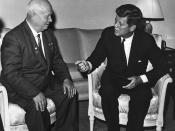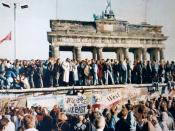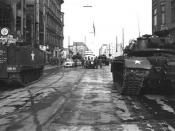"Berlin is the testicles of the West...every time I want to make the West scream I squeeze on Berlin". This philosophy, professed by Soviet leader Nikita Khrushchev, was the root of the Berlin Crisis that mainly occurred from the years 1958-1961, as the superpowers USSR and US argued over the status of Berlin. At this time, Germany was still under four-power occupation; however it was split up into the German Democratic Republic (GDR) under Soviet control, and the Federal Republic of Germany (FRG) under Allied control. The crisis began on November 10th, 1958, when Khrushchev demanded from the Allies that Germany be officially split up into two separate states, and that the Allies withdraw from Berlin. The crisis was handled by the two leaders through verbal wars, diplomatic negotiations, summits, and military posturing, all of which culminated in the erection of the Berlin Wall on August 13th, 1961. The multiple events which were the components of the Berlin Crisis affected the Cold War and its participants in that it nearly brought the superpowers to the brink of another war, it shifted the focus of the Cold War back to Europe and Germany, it changed the world's perceptions of the superpowers and each other, and it caused a rift between the allies.
The Berlin Crisis caused a shift in the military position of the superpowers involved in the Cold War, bringing the USSR and the US to the brink of hot war. Since 1955, the Soviet presence in East Berlin had remained at 20 divisions. Since his election, Kennedy was also dramatically building up military presence in Europe, meaning that a war over Berlin could escalate in a matter of days with the mutual military presence in Europe. The US had purchased 53 U2 spy planes in 1956 that were based...


